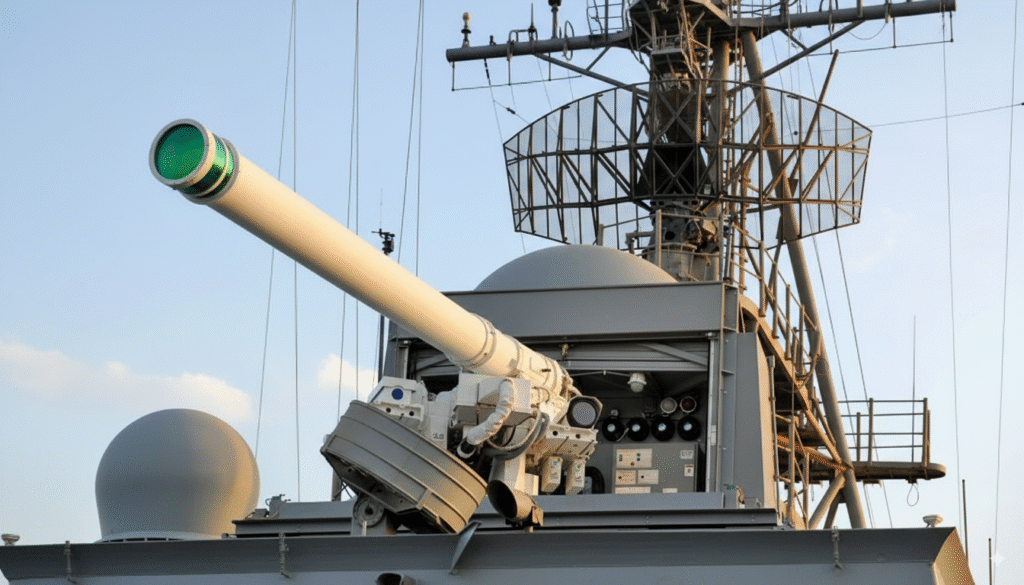
Here is a weapon that has kept even the world’s largest armies awake at night. Its name is the Apollo 100 kW High-Energy Laser Weapon System. If this system truly lives up to what is being reported in the news and written in papers, then the nature, strategy, and balance of warfare will all change. What’s particularly significant is that as India’s DRDO (Defence Research and Development Organisation) works rapidly in this direction, not only our neighbours but the entire world is on alert.
When we hear “laser,” we often think of small laser pointers, but Apollo is entirely different. It focuses a beam of light with such immense power that it neutralizes a target in less than a second. Imagine a beam that vaporizes steel, rips the wings off drones, and incinerates the sensitive electronics of missiles, incapacitating them – all without a traditional explosion, but with a quiet yet decisive strike.
Apollo possesses four formidable characteristics. Firstly, speed. Lasers travel at nearly the speed of light, meaning the engagement time is virtually zero. Once the beam is focused on the target, the enemy will have no time to react. Secondly, extremely low cost per shot. Conventional missiles can cost millions, but a laser shot’s cost is limited to just the electricity consumed. Destroying small targets at a low cost will fundamentally alter strategic weapon systems. Thirdly, an infinite magazine. As long as there is power, one can keep firing. There will be no reloading constraints like with missiles. This is a significant advantage against heavy assaults. Fourthly, precision and limited collateral damage. The laser affects only the intended target, ensuring that surrounding civilians or infrastructure remain unharmed.
For these reasons, it is considered a sophisticated yet lethal weapon. Now, let’s discuss DRDO’s role. DRDO has been researching Directed Energy Weapons (DEW), specifically laser energy weapons, for a decade. After efforts like Project KALI and Durga-II, a 100 kW class system like Apollo could prove to be a game-changer.
DRDO’s objective is not merely to create a prototype, but to develop an indigenous, integrated, and operationally ready system. This means that within the next five to seven years, India will not only employ Apollo-like technology but also be able to produce it at scale.
So, why is the world concerned? Firstly, the response to aerial and drone threats. Apollo could instantly destroy thousands of drones used for infiltration and surveillance along borders. This could be a major deterrent against Pakistani-controlled drone swarms or Chinese-backed drone incursions. Secondly, the redefinition of costs and logistics. Dependence on expensive air defence missiles will decrease. The defence against minor attacks will be possible at a low cost and with continuous, readily available energy shots. Thirdly, multi-dimensional applications in naval, air, and border defence. Laser systems mounted on ships could incinerate anti-ship missiles at sea. In airbase protection, these systems could intercept fighter jets and cruise missiles. Fourthly, political and military pressure. When a nation possesses such capabilities, the regional balance of power automatically shifts. Adversaries will have to rethink their strategies.
We want to emphasize that no new weapon system is entirely negative, but there must be a clear policy regarding its ethical use and control, adherence to international regulations, and civilian impact. Simultaneously, it will be crucial to develop technical excellence and associated safety measures. Experts now believe that the scope of laser weapons will expand significantly in the next five to seven years. The countries that master this technology will become the undisputed rulers of the skies.
Now, indigenous production and deployment of systems like Apollo can reshape future battlefields, from the Himalayas to the Indian Ocean. This is not mere science fiction, but an impending strategic reality. Laser weapon systems like Apollo mean greater security, fewer destructive side effects, and a major shift in the balance of power. What do you think? Will such weapons strengthen global security or create new complex questions?